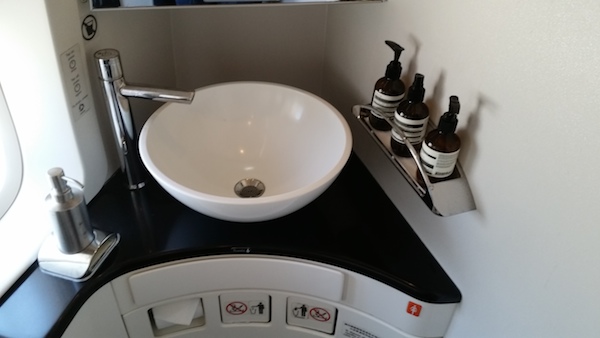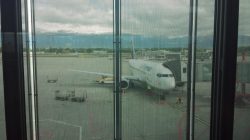Cleanliness is an issue for some frequent travelers, though even for those who care most it doesn’t always mean the same thing. I know people who won’t touch the television remote in a hotel room or who insist on wiping down the tray table on an airplane before use (even if another tray goes on top when a meal is served). These people recount horror stories of the coughing passenger five rows back and take EmergenC before every trip.
I’m not one of those travelers. If anything I think the rising use of antibiotic soaps and hand sanitizers may be a bad thing by promoting drug-resistant infections. I can’t remember the last time I took an aspirin or got a flu shot. The immune system exists for a reason. And yet I will obsess over the appearance of cleanliness. I strongly believe in organization for its own sake: a place for everything and everything in its place.
LoyaltyLobby referenced a story in The Wall Street Journal that talks about the challenges of keeping aircraft clean due to frequent use and short turns throughout the day. Thorough cleaning often doesn’t happen until they’re parked overnight. And while international flights tend to get more scrubbing, it’s partly because they can become incredibly filthy during the trip. I’ve been on 14-hour flights in coach before and it was not pretty. Not only do the lavatories stink, but the walk past the business class cabin on my way to the exit was an obstacle course of newspapers, towels, and pillows strewn across the floor. Again, we have two different kinds of cleanliness at stake.
What I found most interesting about the article was how it discussed the different approaches to cleaning economy and premium cabins:
Sometimes first-class seats get better cleaning. Delta and United say they wipe down first-class tray tables and windows between flights. Coach tray tables and windows don’t get cleaned until overnight.
In both cabins the airline is cleaning up visible mess, but only in the first class cabin is it making the effort to clean the invisible germs left behind. Are people who pay more entitled to better sanitation? Is this simply a realization that there is limited time available? Maybe cleaning 12 first class tray tables is better than an all-or-none approach.
The differences become more extreme when you travel on long-haul flights. I’ve seen flight attendants guard the curtain in shifts so no economy class passenger ever uses the business or first class lavatories. These lavatories are also often larger, with sinks that may have automatic faucets and soap dispensers. A friend once joked about my jetsetting lifestyle and suggested the flight attendants were cleaning the lavatory between each use. I told him he was exactly right.

Again, is this merely a realization that only so much can be done with limited resources? A first class ticket to Hong Kong costs over $10,000 round trip and there may be a dozen passengers or fewer. There’s enough money there to hire extra staff to provide better attention to detail, just like some fine restaurants will gather enough servers to provide everyone at the table their meal simultaneously.
As long as most people aren’t risking their health when they fly in coach I’m not sure it’s an issue. The air is HEPA filtered, and I’ve seen worse toilets — much, much worse — at public beaches and parks. The few times I get sick while flying are usually attributable to stress from a busy schedule and poor sleep, things that would affect my immune system even had I stayed at home. But if popping some Vitamin C pills makes you feel better, truly better or just as an effective placebo, I guess I can’t complain about that, either.


